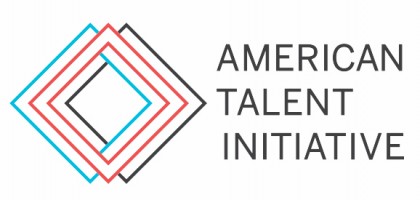Johns Hopkins University is joining 29 other colleges and universities in an effort to expand the number of talented low- and moderate-income students at the U.S. undergraduate institutions with the highest graduation rates.

The newly formed American Talent Initiative, supported by a $1.7 million grant from Bloomberg Philanthropies, brings together a diverse set of public and private institutions. Each commits to enhance its efforts to recruit, support, and graduate lower-income students; to learn from each other; and to contribute to research that will help other colleges and universities expand opportunity.
"Our nation, our economy, and all our citizens benefit from nurturing talented young people from the broadest pool possible, including every community and socioeconomic background," said Ronald J. Daniels, president of Johns Hopkins University. "The university looks forward to working with our ATI partners to ensure students have an opportunity to attend university and realize their full potential."
The 30 founding members expect more of the 270 U.S. institutions with graduation rates of 70 percent or higher to join initiative over the next few years. The overall goal is to enroll 50,000 additional high-achieving, lower-income students at those 270 colleges and universities by 2025, and to help them graduate.
America's top colleges—which already enroll about 430,000 lower-income students, according to the latest federal data—want to further expand access and success for low- and moderate-income students, ATI leaders said. Research shows that when high-achieving, lower-income students attend these institutions, they graduate at higher rates. Those institutions also help earn them a much greater chance of securing leadership positions throughout their lives.
"If we're serious about promoting social mobility in America, we need to ensure that every qualified high school student in the U.S. has an opportunity to attend college," said Michael R. Bloomberg, founder of Bloomberg Philanthropies and three-term mayor of New York. "I'm so glad that so many great colleges and universities have stepped up today and committed themselves towards that goal. This is a vital first step towards creating a more meritocratic society."
Johns Hopkins, which has a six-year graduation rate approaching 94 percent, has a number of programs that help students—especially those from first-generation families and low- and moderate-income backgrounds—attend the university and succeed.
Earlier this year, the university announced that its Rising to the Challenge campaign aims to add $30 million more to $85 million already raised in endowed undergraduate aid for the university's Homewood campus schools. The overall progress for financial aid—both for endowed and current use, graduate and undergraduate—is $488 million.
The Baltimore Scholars Program grants full cost-of-attendance scholarships covering tuition, room and board, and fees to admitted Baltimore City public school graduates with family incomes of $80,000 or less.
The university's multi-year Student Services Excellence Initiative, which is in its early phases, aims to bolster support for students in critical areas, including admissions, financial aid, advising, and career counseling.
The university also has launched programs to help admitted students succeed and reach graduation, including:
- The Hop-In program, which supports any student who needs help with the transition to college, including those who are among the first in their family to go to college or come from high schools with fewer advanced courses
- The two-year JUMP program, which supports students interested in the health professions
- HopReach, which identifies those having academic or other difficulties and connects them with help; it also tracks each intervention to measure success at getting students back on the path to graduation
Institutions participating in the American Talent Initiative will share lessons learned as well as institutional data, annually publishing their progress toward meeting the national goal of 50,000 additional lower-income students by 2025. The Aspen Institute's College Excellence Program and Ithaka S+R, the two not-for-profit organizations coordinating the initiative, will study the practices that lead to measurable progress and share insights and advice through regular publications.
"This initiative speaks to fairness and equal opportunity for thousands of students who currently can't claim either, and to the enormous societal benefit that comes from nurturing all of our most talented young people," said Catherine Bond Hill, Ithaka S+R's managing director and former Vassar College president. "Recent research suggests that at least 12,500 high school seniors per year have SAT scores in the top 10 percent with 3.7 grade point averages or higher—and still do not attend the top 270 colleges. If each of these institutions commits to do its share, an additional 50,000 talented students—12,500 in each grade level—will benefit from the incredible opportunity these colleges and universities offer and that these students have earned."
Institutions participating in American Talent Initiative
Amherst College
Bates College
Davidson College
Dartmouth College
Duke University
Franklin and Marshall College
Georgetown University
Georgia Institute of Technology
Harvard University
Johns Hopkins University
Lehigh University
The Ohio State University
Pomona College
Princeton University
Rice University
Spelman College
Stanford University
University of California, Berkeley
University of California, Los Angeles
University of Maryland, College Park
University of Michigan–Ann Arbor
University of North Carolina at Chapel Hill
University of Richmond
University of Texas at Austin
University of Washington
Vanderbilt University
Vassar College
Washington University in St. Louis
Williams College
Yale University
Posted in University News
Tagged financial aid








